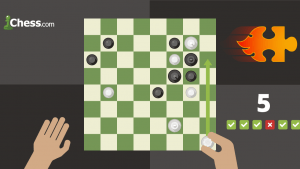
7 Misconceptions about "Chess Players"
When somebody outside of the chess world hears "He/she's a chess player", there are certain pre-programmed misconceptions that automatically fill the mind. While some of these ideas may be based on legitimate stereotypes supported by the broader chess community, most of them are are generalizations extracted from a few prominent figures and then applied to all players, for better or for worse.
Here are a few of strongest stereotypes that are just not true:
 #1 Chess players are smarter
#1 Chess players are smarter
People like to say that chess players are smarter than the average Joe. The truth is, the average chess player is just the average regular person who happens to like chess. And while it has been shown that chess can improve the IQ somewhat, there are contrasting studies that show that chess players ARE smarter... but only when it comes to chess. Knowledge inside the game is not necessarily transferable outside of the game. The other problem with this stereotype is that there are lots of kinds of smart: analytical, mathematical, creative, visionary, street-smart, social intelligence, etc. And when you shake up the bag of collective chess players, your average chess player is, again, an average person who likes chess.
 #2 Chess players are less socially adept
#2 Chess players are less socially adept
I have to be honest. I didn't always believe this was a false stereotype. My first few introductions to chess were awkward. There was the guy who refused to shake hands because of germs. There was the guy who screamed at me because I asked him why he used an analog clock. And then there was the guy who didn't shower - EVER. I've seen this behavior again and again and again at tournaments and clubs. But then one day it hit me - I'm only seeing a tiny sliver of chess players represented. There are more than 600 million people who know how to play chess. I was seeing just the handful that are not too socially busy to be somewhere else aside from chess club on Friday night. And of those, I was focused in on the more eccentric ones just because they are the most interesting. There are just as many examples of amazingly social and charasmatic individuals as there are of oddballs - take Josh Waitzkin, Yasser Seirawan, and Judit Polgar as great examples. I've since met thousands of players at dozens of events, and even more since I launched Chess.com, and it confirms once again that chess players are just a representation of the average population, except that they happen to have discovered the joys of chess.
 #3 Chess players must have amazing memory skills
#3 Chess players must have amazing memory skills
Sure, we've all heard the phenomenal stories of the Grandmaster who can play 30 simultaneous games blindfolded and remember the positions in all of them. And yes, that is impressive. But the truth is that chess players do not have superior memorization skills, and it doesn't take superior memory skills to be a great chess player. Chess players are just tremendously familiar with chunks of pieces, known positions, familiar pawn structures, etc. This quote says it well:
"Remembering fifteen common English words would be no astonishing feat for an English person; it would be for someone who was not acquainted with the language. But his admiration is misplaced; he thinks that the chessplayer is remembering an enormous string of random patterns, for that is how the game appears to him, but in fact the chessplayer is merely speaking in the language of chess, a language with which he is familiar and whose patterns he has seen many times and knows by heart." For more, click here.
In fact, another study has shown that while chess masters ARE much better at memorizing chess positions that occur in natural games, they are no better off than non-chess players are memorizing board positions where the pieces are placed randomly. (More here.)
 #4 Chess players are old, white, euro-caucasian, men
#4 Chess players are old, white, euro-caucasian, men
We've all heard this stereotype, and Pixar didn't help any with their short film called Geri's game. But it isn't even CLOSE to true. First off, chess players are of all ages, from 7-year-old scholastic geniuses to middle-aged players to the senile. Second, chess is huge in India, the Philipines, South America, and growing in China and Africa. Third, more and more women are joining the game. Just click here for a view of some non-white women of all ages playing chess!
 #5 Chess players are poor sports when they lose
#5 Chess players are poor sports when they lose
Though the recent world championship may circumstantially support this claim, chess players are no worse than anyone else in competitive gaming or sports. In fact, I would argue that chess players display greater sportsmanship than others because most smart chess players know that with a loss usually comes learning, and most chess players love learning the game more than they love winning the game. That said, the next time your opponent throws a pawn in your eye don't blame me for not warning you.
 #6 Chess players are not athletic
#6 Chess players are not athletic
Try telling that to the guys in the picture who are competing for the World Championship Chess Boxing Title! Once again, chess appeals to athletes and non-athletes alike. If you look at a random sample of members on Chess.com you will find a lot of profiles that mention other sports, hobbies, and athletic interests. It is true that few grandmasters are top athletes, but that is a function of dedication, not ability. That would be like saying that athletes are not intelligent. It's not true, it is just a matter of prioritization. Another argument is that chess IS a sport, but I won't go there....
Finally, to read about more professional athletes who love chess click here.
 #7 Chess players are nerdy and unsexy
#7 Chess players are nerdy and unsexy
Perhaps the biggest misconception can be wrapped up in the notion that chess players are nerds. And while your particular high school chess club may skew your view, chess players come in all varieties. Take Maria Manakova (featured in the picture to the right). She is a WGM (Woman Grandmaster) who not only has top moves on the chessboard, but also... I'll stop there. Sure, she is the most extreme counter-example we have to the "nerd" fallacy, but again, chess players come from all walks of life.
Next time you hear someone described as a "chess player", I hope you will be a little more open-minded about who that person might actually be. Sure, they might be the pocket-protecting fifty year old man who carries anti-bacterial handwash everywhere he goes (that will be me in 20 years  ), but she might also be an beautiful track star from India or something. You never know!
), but she might also be an beautiful track star from India or something. You never know!

